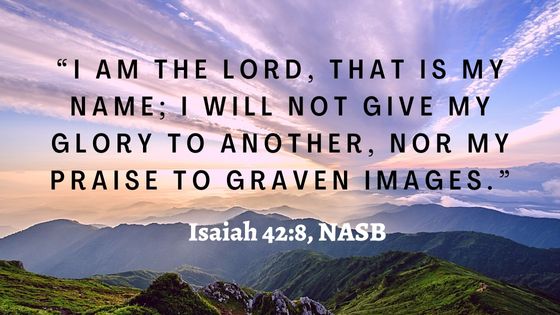Does God have negative characteristics? Or is He the epitome of moral uprightness?
We know of God’s natural and moral attributes. God is love, holy, just, compassionate, forgiving, etc. In short, God is a good God and He is good all the time. But what about the seemingly negative character traits of God that we read in certain Bible passages?
So, is God really good? Or does He sometimes exhibit character traits that are contrary to His natural and moral attributes?
Bible Verse: Nahum 1:2, NKJV
“God is jealous, and the Lord avenges; the Lord avenges and is furious. The Lord will take vengeance on His adversaries, and He reserves wrath for His enemies.”

The intended target of Nahum’s message is the people of Nineveh. Yet the broader audience was made up of God’s people living under the fear of the Assyrians. These people are desperate for a word of hope. And God delivered that message through Nahum.
Three important words in Nahum’s opening lines need our attention because they all relate to the character of God. Nahum used these words to describe God’s character: jealousy, vengeance, and wrath (rage).
These terms have human expressions, but we must understand them carefully when they are applied to God. He is awesome in His jealousy, vengeance, and rage.
Jealousy
Jealousy is a sin if it means being envious of what others have and wanting to possess it.
It’s quite common for neighbors, even siblings, and in-laws, to be envious of each other. For instance, neighbor A isn’t happy that neighbor B has a big, fully furnished house, a brand-new car, and a huge swimming pool.
Neighbor B, on the other hand, is bitter toward neighbor A because the latter has a better-looking husband than her. In addition, neighbor A has 3 beautiful children while she is childless. This kind of jealousy is bad and believers should not feel this way toward one another (Galatians 5:26).
However, jealousy is a virtue if it means cherishing what we have and wanting to protect it. A faithful husband and wife are jealous over one another and do everything they can to keep their relationship exclusive.
“Jealous” and “zealous” come from the same root. When we are jealous over someone, we’re zealous to protect the relationship. Since God made everything and owns everything, He is envious of no one. But since He is the only true God, He is jealous over His glory and His name. God is also jealous over the worship and honor that are due to Him alone.
See Exodus 20:5; 34:14; Deuteronomy 4:24; 5:9; 6:15; 32:16; Joshua 24:19; & Isaiah 42:8.

Vengeance
In Scripture, vengeance is usually presented as a sin. Both Jesus and Paul warned about it (Matthew 5:38-48; Romans 12:17-21).
The OT law of “eye for an eye, tooth for a tooth” was never intended to be applied by individuals in the OT or NT. But it was a standard for the collective society to use to enforce good conduct among people.
But a just and holy God cannot see people flouting His law and do nothing about it. “Vengeance is Mine, and recompense … I will render vengeance to My enemies, and repay those who hate Me.” (Deuteronomy 32:35, 41).
The manner and timing of the repayment of man’s wickedness is God’s prerogative. God takes vengeance by judging people because He is holy and jealous (zealous) for His holy law. God’s anger isn’t like human anger, which can be selfish and out of control. His is holy anger, righteous indignation against all that defies His authority and disobeys His law.
Wrath/Rage
Nahum wrote that “the Lord avenges and is furious” (Nahum 1:1). In verse 6, Nahum says the Lord’s anger is so powerful like a fire that it throws down the rocks. But then Nahum 1:3 assures us that God’s wrath isn’t a fit of rage or a temper tantrum. “The Lord is slow to anger and great in power.”
See also Exodus 34:6; Numbers 14:18; Jonah 4:2.
On the human level, we immediately think of Jesus taking angry action in the Temple courts, driving out the money changers (Matthew 21:12-13). But His godly rage was always under control. God is not a madman who easily gets angry over shallow and irrelevant issues.
Let Jesus be our role model in controlling our anger. It’s not a sin to get angry. But what could lead us to sin is what we do or say in our anger. Some people cannot manage their anger and they tend to become violent. They may shout or scream at people while others like to throw things.
God’s people ought to exercise holy anger against sin (Ephesians 4:26; Psalm 4:4). By NT standards, anger can be either good or bad, depending on motive and purpose. When Paul said, “Be angry and do not sin,” he may have been sanctioning righteous indignation.
This type of anger hates injustice, immorality, ungodliness, and every other sin. When such anger is unselfish and based on love for God and others, it is not only permissible but commanded.

Conclusion
God’s jealousy, wrath, and desire to avenge do not negate His moral character of love, compassion, and goodness. It’s because God is holy and just that He won’t sit idly by and let the wicked go unpunished.
Sometimes, it could be difficult to reconcile God’s love and wrath. If God is a loving, forgiving, and compassionate God, why would He want to punish anyone eternally in hell? Again, it’s because God is holy and He demands justice for sin. And it is for this reason that God sent His Son to die on the cross to save us from eternal condemnation in hell (John 3:16).
We are all sinners; we sinned against God and arouse His jealousy and anger. We deserve to suffer God’s wrath and vengeance and be separated eternally from God. But God is morally upright. He does not want to punish us without giving us a chance to repent and make things right with Him.
If you haven’t yet repented of your sin and rebellion, would you do it today and receive God’s forgiveness? Would you confess Jesus as Lord and Savior of your life and live and serve Him for the rest of your life?
Sinner’s Prayer
If God is convicting you of your sin right now, you may pray this short prayer wholeheartedly.
Dear God,
I thank you for your gift of eternal life. I acknowledge that I am a sinner in need of forgiveness and salvation because I cannot save myself. I repent of all my sins and I put my complete trust in you alone, Lord Jesus, as my Savior. I believe that Jesus is the Son of God, that He died for my sins on the cross, and that He rose from the dead to redeem me. I invite you now Lord Jesus to come into my heart and life. Thank you for your wonderful grace and forgiveness. I ask that you write my name in the Lamb’s Book of Life.
This is my prayer in Jesus’ name, Amen!
Do not delay for tomorrow may be too late. Now is the day of salvation (2 Corinthians 6:2).
Disclaimer: As an Amazon Associate, I may earn a commission when you use any links on this page to make a purchase, but at no additional cost to you.
Recommended Resource:
God, Himself: A Journey Through His Attributes by Tony Evans
How often do we stop to consider who the God is that we worship?
When we draw near and learn more about this God, we become amazed at who He truly is. Join Tony Evans as he dives into the character of our awesome God—one attribute at a time.
In God, Himself, we are invited, with unveiled faces, to behold the glory of the Lord—just as the Apostle Paul instructed the Corinthians to do.
Dr. Evans offers insights about the character of God that will challenge you to pursue greater intimacy with Him and help you understand more fully what it means to be made in His image.
For after all, as image-bearers knowing who He is defines who we are.
You’ll learn about attributes like God’s wisdom and word, His sufficiency, and sovereignty, and His goodness, grace, and glory that make Him the great God that He is.
Dr. Evans also includes activities and challenges to help you know how to both process and respond to learning about God.
Find your heart encouraged and your worship enriched as you learn about the beautiful nature of our God, the source of all goodness and life.

